Key takeaways:
- Oceans contribute significantly to global oxygen production and their health is threatened by pollution, impacting both marine life and human food safety.
- Community cleanups foster connections among participants and increase awareness of environmental issues, resulting in a stronger commitment to ocean conservation.
- Personal experiences during beach cleanups highlight the importance of educating younger generations and inspire individuals to adopt sustainable practices in their daily lives.
- Organizing successful cleanups involves selecting accessible locations, promoting events on social media, and ensuring necessary supplies are available for participants.
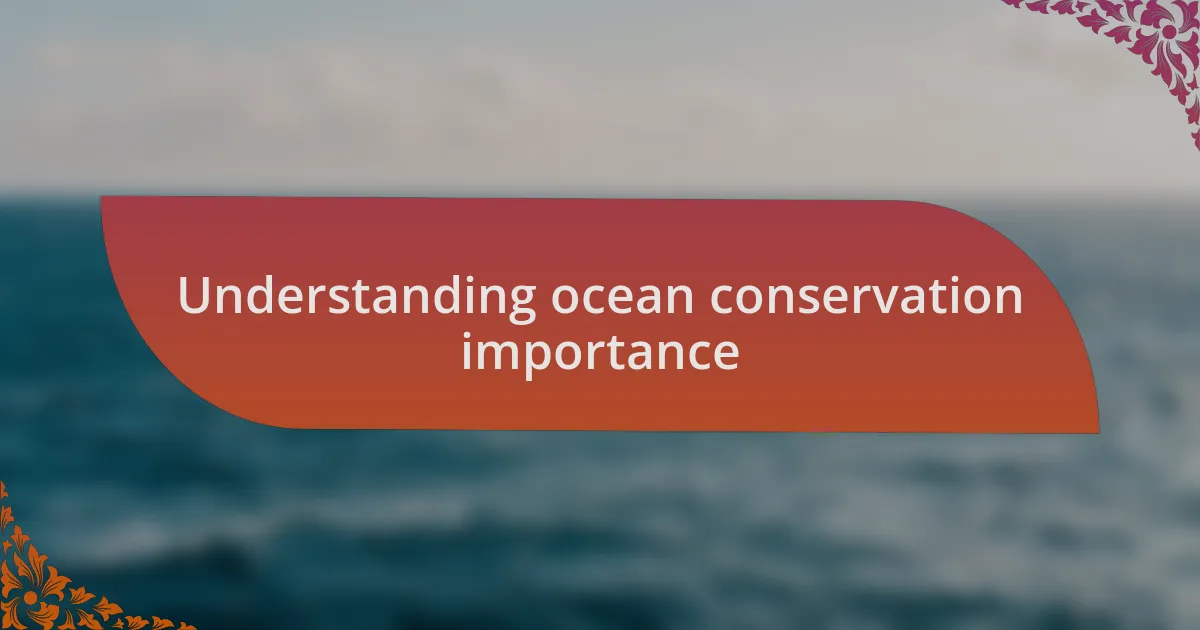
Understanding ocean conservation importance
Understanding the importance of ocean conservation starts with recognizing the vital role oceans play in our ecosystem. For example, during one of my beach cleanups, I saw firsthand the impact of marine debris on wildlife. It struck me how easily we forget that everything we toss aside can lead to suffering for a sea turtle or a bird.
Oceans produce over half of the oxygen we breathe, yet pollution threatens their health every day. I’ve encountered people who didn’t realize that their discarded plastics could end up in the belly of a fish or a seabird. Isn’t it alarming to think that our everyday habits can disrupt a complex ecological balance?
The ocean is a source of food, livelihood, and inspiration for millions around the world. I recall hearing stories from local fishermen about declining fish populations due to habitat destruction. Listening to their concerns made it clear: when we invest in the health of our oceans, we’re also investing in the well-being of communities that depend on them.
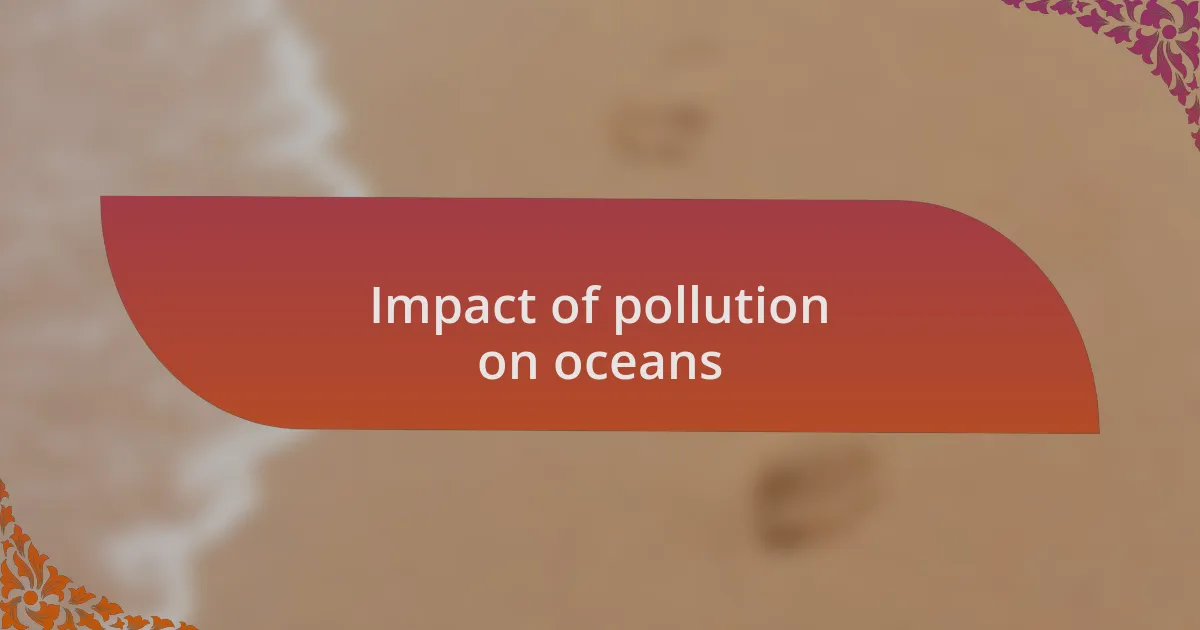
Impact of pollution on oceans
Pollution directly impacts marine life and the fragile ecosystems within our oceans. During a recent cleanup, I was struck by the sheer quantity of plastic waste strewn across the shoreline. It dawned on me how these materials not only create unsightly views but also entrap and harm countless marine creatures, stifling their natural behavior and causing unnecessary suffering.
Coral reefs, often referred to as the lungs of the ocean, are particularly vulnerable to pollution. I remember snorkeling near a reef and witnessing the stark contrast between healthy and polluted areas; the vibrancy of life in the thriving sections illustrated just how significant our actions are. It made me wonder: if we are poisoning these ecosystems, what long-term effects will that have on the marine biodiversity we cherish?
The impact of pollution extends beyond the ocean; it seeps into our food chain, reaching our dinner plates. I’ve spoken to many individuals who were shocked to learn that seafood can accumulate toxins from polluted waters. This reality hits home when you realize that enjoying a meal could inadvertently mean consuming harmful substances. It’s a wake-up call to recognize our responsibility in safeguarding the ocean for future generations.
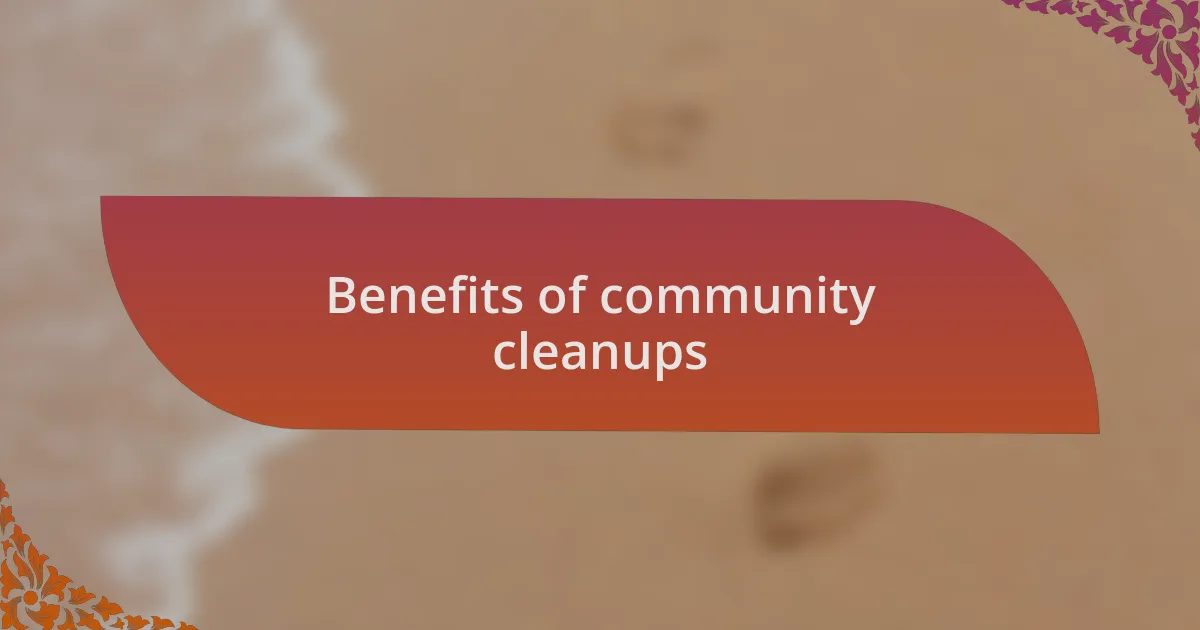
Benefits of community cleanups
Participating in community cleanups fosters a profound sense of connection among volunteers, creating bonds that extend beyond just gathering trash. I vividly recall meeting a marine biology student at one such event, and our shared interest sparked discussions that enriched my understanding of marine ecosystems. These moments of camaraderie not only make the labor enjoyable but also inspire collective action for a healthier ocean.
Another significant benefit is the educational aspect of cleanups. I’ve had the chance to engage with families and friends during these events, discussing the origins of the litter we find. It’s astonishing how a simple piece of plastic can lead to a deeper conversation about consumer choices and their environmental impact. This shared knowledge cultivates a community that’s more aware and proactive in environmental stewardship.
Moreover, the visible transformation of a polluted beach into a clean, inviting space is incredibly rewarding. I remember the day we tackled a particularly littered stretch; the joy in everyone’s eyes as we saw the difference we made was palpable. It begs the question: how empowering is it to know that our collective efforts can create tangible change in our local environment? The satisfaction gained from such community efforts not only uplifts spirits but also reinforces our collective responsibility toward ocean conservation.
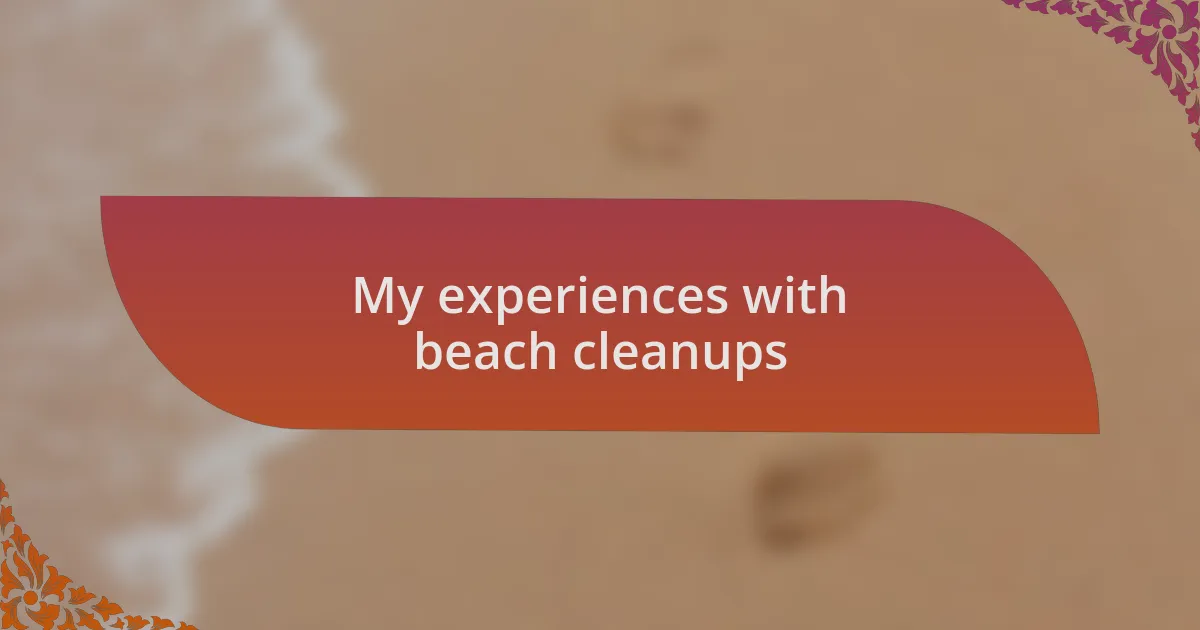
My experiences with beach cleanups
Participating in beach cleanups has been a transformative experience for me. I vividly remember my first cleanup; I was overwhelmed not just by the amount of trash we found, but by the unwavering spirit of the group. There was a moment when a child, no more than eight, picked up a plastic bottle and turned to me, asking why people litter. That question stayed with me; it’s a stark reminder of how crucial it is to educate the younger generations about their impact on our oceans.
On another occasion, I found myself knee-deep in sand, collecting scraps while having a heartfelt conversation with a local artist who uses ocean waste in their work. Their passion for sustainability resonated deeply with me, prompting me to reflect on the ways I, too, could integrate ocean conservation into my daily life. These connections highlight how cleanups are not just about picking up litter; they’re about nurturing a sense of community and shared purpose.
There’s an indescribable rush that comes from witnessing a beach transform from a litter-strewn battlefield to a pristine shoreline. After one particularly exhausting day, as we stood back to admire our work, I felt such a profound connection to the ocean. It made me wonder: how many small actions do we take that ripple out to create significant change? These reflections have not only solidified my commitment to conservation but have also inspired me to advocate for more sustainable practices in my own life.
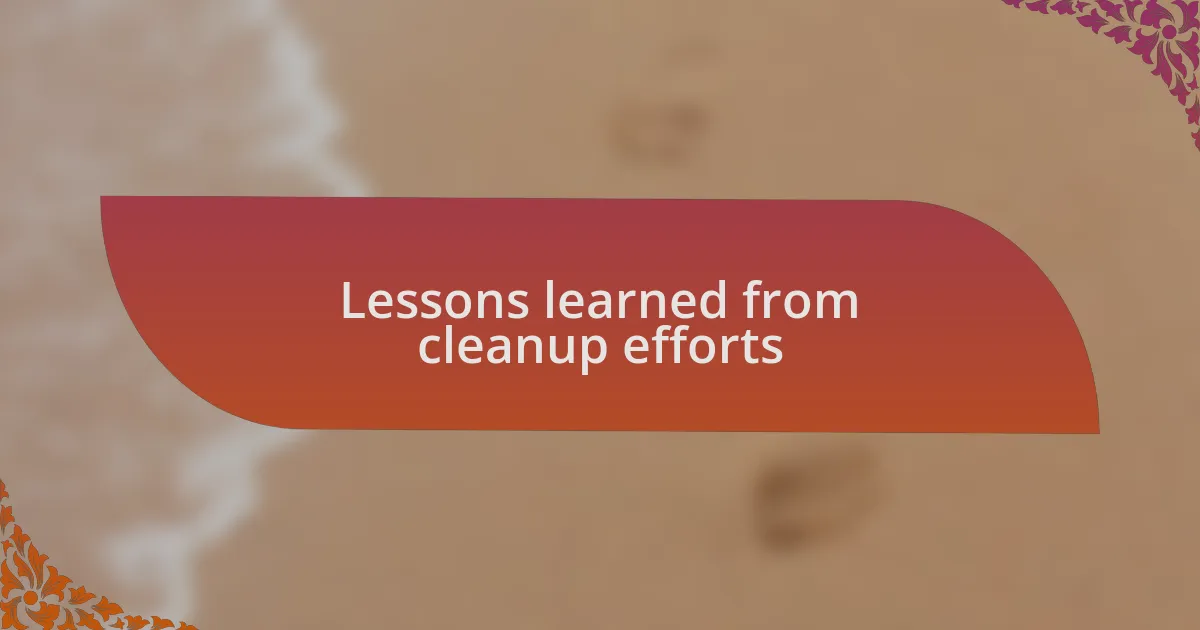
Lessons learned from cleanup efforts
Engaging in beach cleanups has taught me the power of community involvement. During one particular event, I found myself side by side with a retired marine biologist who shared stories of how pollution impacted marine life. His passion reminded me that every piece of trash we pick up is a step toward healing the ocean. It made me realize how critical it is for us to come together, to share knowledge and experiences, because teamwork amplifies our impact.
One lesson that stands out is the sheer volume of microplastics we’ve discovered hidden beneath the sand. On one frantic search, I kneeled down to dig out a handful of these tiny particles, and it struck me just how pervasive plastic pollution has become. I often wonder, how many of us are aware that even the tiniest bits of plastic can harm marine ecosystems? This realization prompted me to educate myself further about responsible consumption and to advocate for reducing single-use plastics.
Through cleanup efforts, I’ve learned that change starts at the individual level. After each event, I always feel a surge of motivation to implement new habits in my life. Whether it’s opting for reusable bags or refusing straws, it dawned on me that these small decisions contribute to a larger movement. So, I ask you, what changes can you make in your daily routine to protect our oceans? It’s these personal commitments that can lead to a cleaner, healthier ocean.
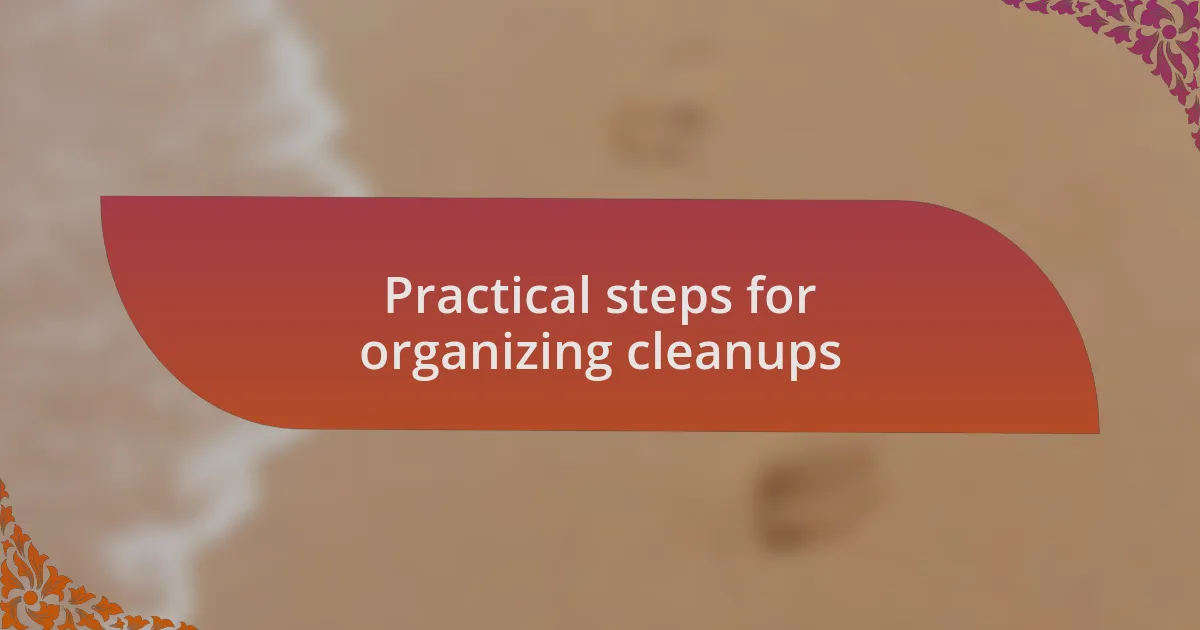
Practical steps for organizing cleanups
When organizing a beach cleanup, the first step is choosing an accessible location and setting a clear date and time. I remember the excitement of rallying friends and family for my first cleanup; we selected a popular beach that needed our attention. It was uplifting to see everyone gather, fueled by a common cause.
Next, I found that promoting the event through social media was incredibly effective. I shared my passion and the reasons behind our cleanup, which motivated others to join. Reflecting on that experience, isn’t it amazing how a single post can inspire people to get involved in ocean conservation?
Lastly, I learned the importance of providing supplies like trash bags and gloves. During one event, a beachgoer asked if we had any extras to hand out, and it struck me how prepared we need to be to make participation easy for everyone. It’s these little touches that encourage more people to jump in and make a difference. What barriers can we remove to foster participation in our cleanups?
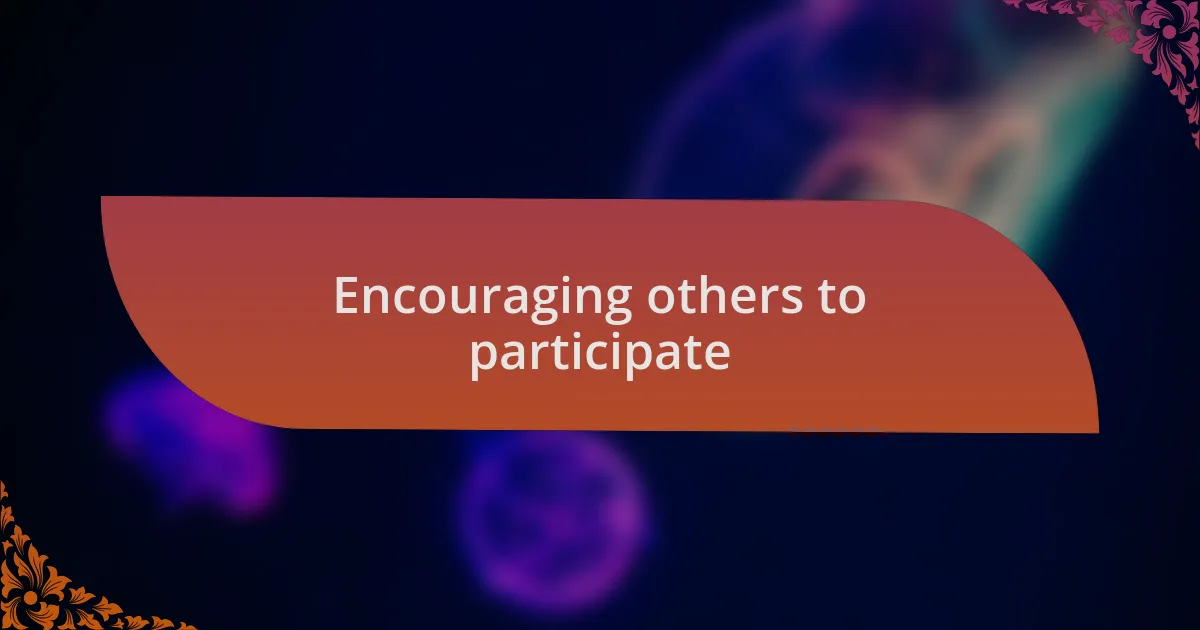
Encouraging others to participate
It’s fascinating to see how sharing personal stories about beach cleanups can ignite interest in others. I remember telling a friend about the incredible sense of community I felt during my first cleanup. That conversation sparked her curiosity, and soon she was organizing her own event, proving how quickly enthusiasm can spread when we connect on a personal level.
One effective strategy I discovered is to invite people not just to participate but to share their own motivations for getting involved. During a recent cleanup, I asked participants to reflect on why the ocean matters to them. I was genuinely moved by their responses, and I realized that when individuals connect their personal experiences with a larger cause, they are often more motivated to continue participating.
Have you ever thought about how easy it is to inspire others with a simple invitation? Sometimes, just asking a colleague to join you can make all the difference. I’ve seen it firsthand—when I invited my coworkers, their excitement turned a solo effort into a group initiative. It became a wonderful reminder that our collective actions, sparked by a single invitation, can contribute to a larger movement for ocean conservation.